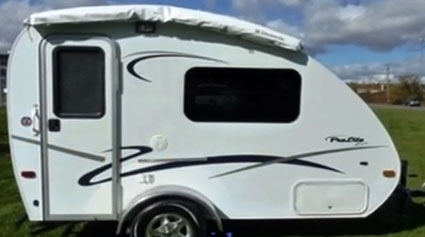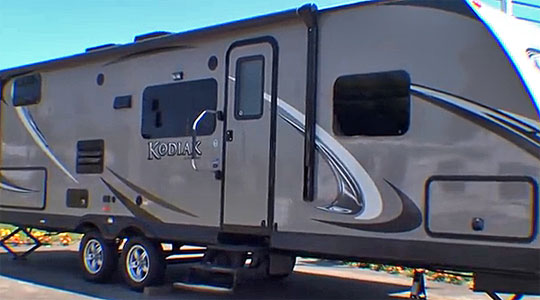Buying Lite Travel Trailer
Guide
Buying a travel trailer is a compromise between what you can afford and a long list of your wishes and dreams; here is how to make it the wise and educated decision....
Buying the travel trailer is a difficult task.
It is like buying at the same time the car (because travel trailer is a vehicle) and the home (because it is the recreational “thing”).
In other words the travel trailers have to meet several requirements common to those expected from cars and homes.
Let’s face it – the recreational vehicle is not an inexpensive toy.
Its cost most likely will be higher than the cost of an average car and in some cases may be even close to that of the house. And similarly as car and home – it should serve you for years…
Once purchased, your travel trailer should “expand” the quality of your life, offer possibilities to actively take part in outdoor activities, to pursue your dreams…. In most cases the car is just a tool you use to commute to work, to do shopping, to visit friends. Your recreational vehicle is the place you will be spending a lot of your “free” time and it better be the happy time…
That is why, the decision to choose and then buy the travel trailer should be wise and educated. On this page we will try to help you to make this process smooth and efficient.
Factors to consider when buying the Travel Trailer
#1 The Budget
First things first in this economy is of course what your budget looks like for the purchase of your first travel trailer. Depending on what you want, they can be very reasonable with some of the more basic models starting off at around $18,000, but if you desire to travel in luxury and with all the amenities at your fingertips, then those prices can quickly soar closer to 100,000. Travel trailer websites are filled with hundreds of unique trailers, and by figuring out what is your “firm” limit, you can pare down which ones you wish to consider. This way you can set your sights on an affordable trailer in your price range and then you won’t find yourself overly tempted by the more deluxe models.
Keep in mind that once you “fall in love” with the trailer that is over you limits, you may end-up having it on your driveway, but unable to take it on the road due to lack of cash for vacations!

Prolite Eco 12 Ultra Lite Travel Trailer is small, but may serve well those less-luxury demanding and more nature oriented campers
#2 Category
Let’s start with most important statement which is: “Lightweight” is the word of this century.
It will stay like that and the only expected future trend is: lighter. Manufacturers of modern travel trailers (and in general recreational vehicles) are shaving-off hundreds of pounds of weight to make them more eco-friendly, more economic and durable.
These days “Lite” does not mean poor quality or poor reliability. As the matter of fact new materials (aluminum, composites, fiberglass...) have much better parameters than previously used ones like wood (prone to rot), steel (corrosion) and in general limited tolerance to weather elements….
So when searching for your favorite travel trailer focus on those belonging to the new emerging category of recreational vehicles: Lite Travel Trailers.

.... and on the high-end you will find modern, lite, 4-season "home-like" travel trailers with slide-outs (here Kodiak)
#3 Type and size
This is one of the most important questions you have to find answers to. And it has several aspects:
a) What is your lifestyle when on vacations?
For example, if you expect to get to the campground, set-up your trailer for the length of your vacations and enjoy the time then a pop-up or hybrid travel trailer will do the job. However, if you would like rather to “hit-the-road”, the vision of setting up and folding down your trailer on a daily basis may take a lot of your “enthusiasm” you would like to keep for more pleasurable activities. In such case most likely you would prefer a “rigid-shell” type of travel trailer;
b) What are your preferred outdoor activities?
Just to help you: either you are a “family-type” guy thinking about campground with all amenities and services and nearby beach or playground with kids, or you prefer to take “roads less travelled” (meaning wilderness, off-road trips, carrying your favorite ATV or motorbike…etc). Each of these extreme cases will lead you to quite different requirements for your travel trailer!
c) How big is your family or circle of friends you would like to travel with.
It may also come to the question – how much elbow room you would like to have inside.
Some of the smallest travel trailers come with just a bed and a sparse kitchen and may measure only 10 feet long. Larger trailers with actual bedrooms for privacy and larger living areas can be as long as 37 feet, though most people choose one that measures between 20 and 25 feet in length.
d) How much time you would like to spend living “mobile”?
Travel trailer for two weeks vacations or few weekends a year obviously has different set of requirements than the one you would like to live for months (this option is actually attractive for retirement). Keep in mind that these days “Retirement” is not a remote future that never happens, it is more and more often reality of our times. Either as the conscious decision (early retirement), or forced one by “circumstances”….
e) Are your vacations limited to the traditional summer season?
These days the notion ”off-Season” is losing its meaning. For many of us, whole year offers opportunities for travelling and camping. If this is your case, you may consider the Four Season travel trailer allowing you to travel to snow covered areas and in general to climate zones with freezing temperatures.
The main difference of 4-seasons travel trailers compared to the regular ones is: much better shell insulation and protection of tanks and plumbing (usually the “underbelly” area).
#4 Weight towable
The next step in your journey is to correctly calculate the maximum amount of weight you are able safely tow with the car or truck you will be using.
It’s an important step because these days more and more often we use our standard minivans, SUVs or even family cars to tow the trailers.
That is a big difference compared to the past approach of using a heavy-duty truck for towing, that usually was “up to the task” with a good safety margin!
This exercise starts in your Car Operating Manual or, if you do not have one - at your car’s dealer. The number you need is:
Maximum weight of the load that can be towed by your car (Tow Vehicle)!
Let’s call it TR-GVWR (Trailer Gross Vehicle Weight Rating).
This number can be found by knowing the following two components:
a) TV- GCWR (Tow Vehicle Gross Combined Weight Rating) – this is the combined maximum weight of the tow vehicle and the trailer (assuming that the trailer has its own brakes!).
b) TV-AW (Tow Vehicle Actual Weight) of your tow car (when going on the trip).
Please note that this number combines the weight of the tow vehicle itself with the full tank all passengers, cargo (whenever it is – back seats or trunk) and towing hitch (yes, it has its weight).
Note: It is a matter of safety, so be conservative when making these calculation. You may think, the car will have only driver and one passenger, but in the future things may quickly change (kids, friends etc…). What you do not want when on the road is the “Tail wagging the dog” effect” or in more practical words – you would like to avoid the situation when it is not you pulling the trailer, but the trailer pushing you!
Having say that, it may be wise to replace the TV-AW (which may change on a “case-to-case” basis), by the TV-GVWR (Tow Vehicle Gross Vehicle Weight Rating) determined by manufacturer and defined as the maximum permissible weight of your vehicle when ready for travel.
All these numbers lead to the following answer:
TR-GVWR = (TV-GCWR) – (TV-GVWR) - conservative but safe number
TR-GVWR = (TV-GCWR) – (TV_AW) - number that must be verified on “case-by-case” basis (in other words expect “headaches”)
Armed with this information you can start checking the TR-GVWR (Gross Vehicle Weight Rating) for travel trailers. Manufacturers of recreational vehicles simply call it GVWR.
In most cases GVWR is provided in details including:
a) Unloaded trailer weight
b) Hitch weight
c) Cargo capacity
The latter takes into account all water tanks and LP gas.
And just for the completeness of the matter: Do not forget to check the limits for hitch loading. There are two numbers to verify:
a) Maximum tow rating (must be higher than TR-GCWR)
b) Maximum Vertical Load (must be higher than that produced by the trailer)
Once we came to the real numbers, it should be easier to agree that Lightweight Travel Trailers are the best option for mass recreational market.
It's not the rocket science :-)
And now, once you have answer to all questions described above the fun part starts:
#5 Amenities
Carefully weigh the amenities that you would like to have for both comfort and practicality when you head out on vacation in your new trailer.
Would you like to have only the simplest and basic things such as a shower and a place to sleep? Then a more compact unit may be just the ticket. However, others may want a taste of the finer things in life after a full day hiking or fishing and would like a full bathroom, along with all their televisions and radios at their fingertips, as well as a big kitchen area to cook a full meal…..
Take your time as here the sky is the limit….
You may also check: --> Tips for buying RVs
.
About Us / Privacy Policy / Resources
Go to: Pop-up Travel Trailers and RVs
or Benefits of Lightweight Travel Trailers